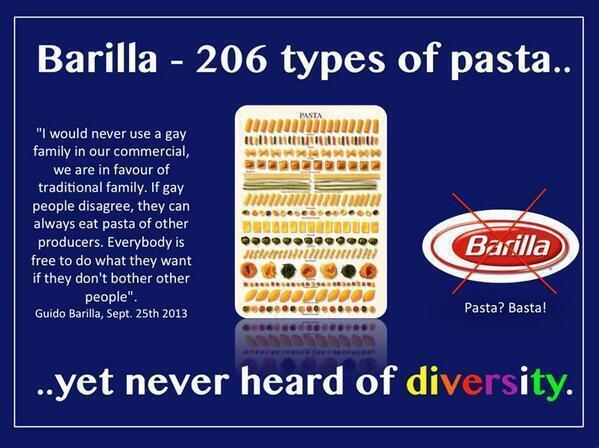If you haven’t read about the Barilla LGBT boycott yet, here’s a brief update: Yesterday, the president of the company, Guido Barilla, said that he “would never do (a commercial) with a homosexual family” because he doesn’t “agree with them,” and suggested that if gays didn’t like it, they could get their pasta elsewhere. This caused outrage around the world and activists quickly issued calls for a boycott of the company.
You might think that this is just another Chick-fil-A case in which LGBT activism becomes a simplistic decision about being for or against a corporation, as J. Bryan Lowder argued here yesterday. But there is more to this story: Since the controversy started in Italy and involves an Italian company, it’s really about the state of LGBT life in my home country. I understand and agree with Bryan’s concern about not transforming LGBT activism into implicit support of corporate personhood, but as an Italian who immigrated to the U.K. (partly because I’m LGBT), I can assure you that is not what’s happening. When angry Italian people started tweeting about Barilla’s statements, they were not only calling for the boycott of a specific company—they were protesting against a system of legitimized public homophobia.
Guido Barilla’s comments are just the most recent in the barrage of bigoted public declarations that Italian LGBT people read on a weekly basis coming from MPs and other public figures like famous football players, actors, and now also corporate officers. But what made this time different was that, in a country where there is no public condemnation for homophobic speech, boycotting a specific brand is the only practical way of fighting back. Italian LGBT people and Italians sympathetic with the cause have started tweeting with the hashtags #boycottBarilla and #boicottaBarilla and making fun of Barilla’s advertisements. These viral protests have in turn attracted even more support through social media and involved non-LGBT people in the discussion, which is genuinely unprecedented in Italy.
To understand this response, you need to understand the larger state of gay rights in the country; this campaign is not only about the comments themselves. Regardless of what statistics say about the state of homophobia in Italy, there is a general feeling of exasperation among LGBT people there. Just a few days ago, the Parliament decided to respond to a rise in homophobic violence in the last years with an anti-homophobia law, but LGBT activists called it “useless” since it protects anti-gay speech within political, cultural and religious groups. The debate accompanying the law has been characterized by homophobic remarks from members of various political parties who continually spoke of a “right not to like gays” in terms of freedom of speech. So, when Guido Barilla shared his bigoted opinions, his comments became a casus belli to talk about how far the normalization of public homophobia can go.
But the real power of this boycotting campaign is that it has spread over the Italian borders due to the smart use of social media to attract wider European and international attention. While Guido Barilla might have naively thought he was merely in line with “the spirit of the times” in homophobic Italy, his comments sound even more misplaced in Barilla’s global market where many countries have laws that protect gay families. Yes, I know it’s sad that we must engage with corporate forces to start a conversation about LGBT rights in Italy, but if the Italian political institutions do not respond to our demands for protection, what else would you suggest we do?
Now, if you are concerned that your boycott of Barilla in the U.S. or elsewhere won’t have any effect, be assured that Italian politicians are already paying attention. During a political discussion in the Italian Parliament on the “Barilla case” yesterday, an MP from the Lega Party decided to provoke two openly gay MPs with a fennel bulb (finocchio is the Italian slang for “faggot”) and to try to physically assault one of them. I know this scene might sound surreal, but it is indicative of the state of affairs in Italy. In such a charged context, even a simple public boycott becomes a very political gesture.
In the end, this Barilla campaign is not really about the potentially minor impact of boycotting—it’s about the possibility of protesting itself. And it’s about how an invisible minority of LGBT people is finally finding a way to speak for itself to a national and international audience. In a country where there are very few public intellectuals speaking for the LGBT community (and many scared just to come out), this feels grass-roots, this feels fresh. Even if it fades quickly, at least it gave us a chance to talk about the terrible situation of the gay people in Italy—and for that, the campaign deserves your respect.
